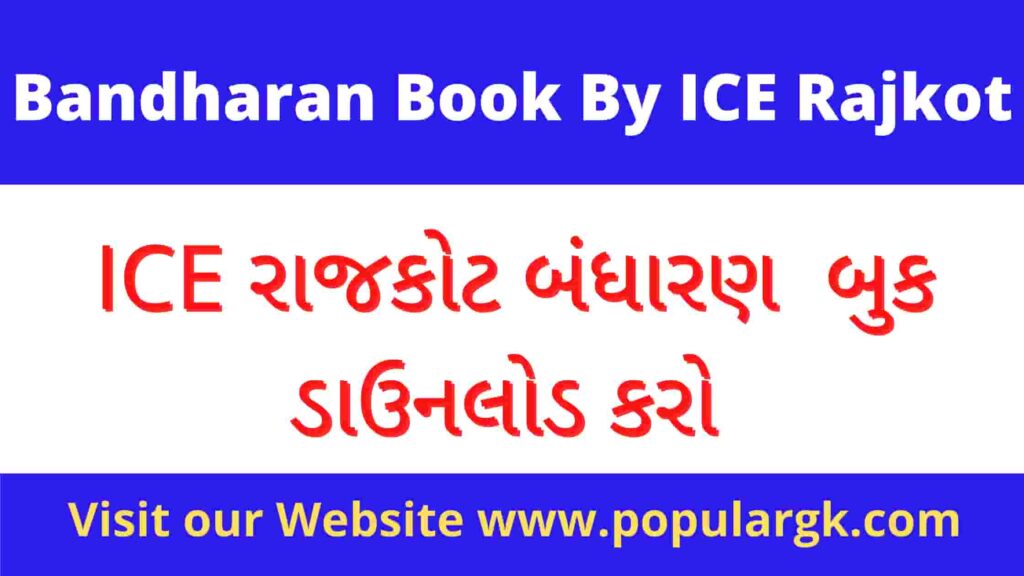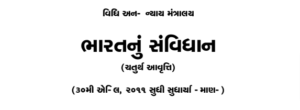This book is by ICE Academy Rajkot. Bandharan Book By ICE Rajkot, there are 300 Questions and answers. this book has 9 pages. They covered all-important Questions of the Indian Constitution. all questions are one-liners. It means there are not any brief indurations about constitutions.

Download OR View Click Here For More
I don’t think there is a law, in which, you can ask your doctor what the sex of the baby is going to be because in the U.S. the doctor doesn’t expect you to go and abort the child if it is a girl. So you don’t need a law over here which tells you that. So in India, we have a law where you can not ask the doctor what the sex of the child is and the doctor is not allowed to tell you, so both the doctor and the parents could be in jail if they ask the question and that question is answered.
Now, this law is actually — it tells us what we are. This law is needed for us, unfortunately, otherwise, you know, in other societies you don’t need this as a law. Zainab: Usually you celebrate: “I have a girl!” Aamir: Yeah, there’s another law we have in India, where, where, as a criminal you can’t stand for elections. You need a law for that.
I mean, it’s sad. What I’m saying is sad, you know, it’ slike black humor. If a criminal stands for elections anywhere in the world he won’t get a single vote, but in India, we have to have a law, because Indians we’ve, in the past, seeing that we do end up voting for criminals. So we need to have a law which tells us you, you know, you can’t stand for elections if you are a criminal.
So, you see, these laws actually tell us a lot about what we are. Dowry Issues Aamir: Contextualize it for people who live here in the U.S.I would imagine about 90 to 95% of people in India have either given dowry or taken dowry or both. So when you are communicating to the huge majority of the country and telling them that what they have been indulging in, perhaps not the best thing to do and most probably the TV that they are watching your show on, has also come in dowry.
So you, you have to — which is, which is so important for us to communicate this with love and we had this discussion very early on with the core team I said: “Why are we – with what driving emotion are we doing this show? Are we doing this show in anger, because then our conversation is different and I’m not doing this with anger, I’m doing this with love, because I really that only with love can you actually, you know, affect a person and bring about change.
There is so many things that we need to and that we have to look inward and I’m included in that. I’m not excluded in that we need to look inward, you know, at ourselves. Zainab: But did it make people uncomfortable that you touched on these very – I mean how did they respond? Aamir: Well, you know, by and large, the huge majority – the very positive thing that I want to tell you, is that the huge majority of Indians just loved the show and that speaks a lot for what is India is today.
It speaks a lot about the fact that India wants to change. India is ready for change. I mean, I would have imagined, none of us had imagined a show which is speaking such heavy topics, would be so popular across the country and the fact that is so popular, really speaks well for us as Indians today. That we have issues that we have problems but we want to leave them behind, we want to come out of them and we really want to move ahead and improve ourselves. I think that’s what the success of the show tells us.
Zainab: Has there like – how do you come up about choosing the subjects? I mean… Aamir: We have a lot of fights. Zainab: And I mean are there subjects where you say “we’re not going to touch that”? Aamir: No, so far, that’s never been the case. We’ve picked really difficult topics as well. On of the really difficult topics was untouchability, which is a big issue in India. The constitution of our country says that we are all equal, but in reality that’s not so yet.
It’s a journey that we have to – it’s still a journey that we are on the reach there. Sure equality is an issue in a lot of societies, but I think in India, because of the way the caste system is, it just makes it a lot more complicated. So – and that’s a very touchy topic as well. It’s a topic that people feel very emotional about, so, so – and 15% of India, roughly 15% of India is Dalits, which is the untouchable caste and so therefore 85% is not Dalits and we are communicating with 85% of the country.



Pingback: Best ICE Rajkot Books PDF Material Free Download 2020